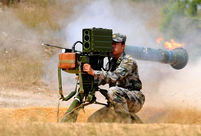 Shocking moments when PLA's weapons open fire
Shocking moments when PLA's weapons open fire Famous Lanzhou beef noodles
Famous Lanzhou beef noodles Armed Police hold anti-terrorism drill in SE China's Xiamen
Armed Police hold anti-terrorism drill in SE China's Xiamen Harbin Int'l Ice and Snow Festival opens
Harbin Int'l Ice and Snow Festival opens 'Jin' named the word of the year by cross-strait netizens
'Jin' named the word of the year by cross-strait netizens Chinese scientific expedition goes to build new Antarctica station
Chinese scientific expedition goes to build new Antarctica station
 Chinese naval escort fleet conducts replenishment in Indian Ocean
Chinese naval escort fleet conducts replenishment in Indian Ocean 17th joint patrol of Mekong River to start
17th joint patrol of Mekong River to start China's moon rover, lander photograph each other
China's moon rover, lander photograph each otherWhen Dong Guanpeng, a professor with 12 years of experience training government spokespeople, learned that he would have eight students from the Chinese military for the first time, he was not surprised.
More transparency is inevitable since the outside world is thirsty for more firsthand and timely information about the Chinese military, said Dong, dean of the Academy of Media and Public Affairs under Communication University of China.
"Considering their rich experience of working with the media and impressive performance during the three-day course, I believe they are competent for the job and won't shun sensitive questions," Dong said.
In November, the People's Liberation Army and the People's Armed Police Force named Dong's eight students as media representatives for their seven military branches. The military previously released information through representatives from the Ministry of National Defense.
Except for the two navy representatives, most of the officials are in charge of information and publicity from their own branches.
The move came amid China's latest efforts to boost its military transparency. Last year, for instance, saw the military publicly show China's fleet of nuclear submarines for the first time in more than four decades and discuss for the first time the number of military exercises it would hold.
But criticism of the Chinese military's transparency, or alleged lack thereof, has never stopped, while the military's disclosing its moves were alleged to be "aggressiveness" in the face of territorial disputes with neighbors in the South and East China seas.
However, observers said the Chinese military, with its growing self-confidence, is making efforts to enhance transparency and show its sincerity to enhance mutual trust with the outside world.
Zhang Junshe, deputy director of the PLA Naval Military Studies Research Institute, said the navy has one more representative than the other six branches do because the burgeoning force wants to ensure its booming information flows correctly and efficiently.
The navy also has the only spokesman from the combat department of the military — Liang Yang, a 43-year-old former navy captain.
The development and openness of the Chinese navy made great strides last year.
It launched its largest-ever naval drill with its Russian counterpart in the Sea of Japan in July. While docked at Russia's Far East city of Vladivostok, the Chinese fleet held an open house for residents and Russian forces.
In November, China invited both Chinese and foreign reporters to a naval base in Zhoushan to visit the Chinese navy hospital ship Peace Ark before the ship's departure for a medical-aid mission to the typhoon-hit areas of the Philippines.
About a week later, the navy also revealed that China's sole aircraft carrier, the Liaoning, headed for sea trials in the South China Sea for the first time.
Oliver Brauner, a researcher at the China and Global Security Project at the Stockholm International Peace Research Institute, said increasing military transparency through the introduction of a spokespersons system and China's continued participation in United Nations peacekeeping efforts can be used to win international trust.
It might also be helpful for China to provide more information on the purpose of basing the Liaoning and potential future aircraft carriers in Sanya, Hainan province. Regional and international actors might be concerned that these capacities will be used to enforce either a new Air Defense Identification Zone or Chinese territorial claims in the South China Sea, Brauner said.
But Zhang said that although no country can have total transparency, attacks on Chinese military transparency are unlikely to stop.
China has made its defensive national strategies clear, but the West believes that its growing military strength will become a threat, Zhang said.
"Such a stereotype is difficult to change, but China is focusing on the right thing: improving transparency to gain trust and the ability to better achieve national and regional stability," he said.
 In photos: Ten 'tuhao' devices in 2013
In photos: Ten 'tuhao' devices in 2013 College students saved from an ice hole by brave citizens
College students saved from an ice hole by brave citizens Gallery: Top 10 box office hits in 2013
Gallery: Top 10 box office hits in 2013 Beautiful churches around the world
Beautiful churches around the world Yang Mi, Hawick Lau hold wedding in Bali
Yang Mi, Hawick Lau hold wedding in Bali 'Phubbing' people seen everywhere
'Phubbing' people seen everywhere World's biggest snack shop in China
World's biggest snack shop in China Shocking moments when PLA's weapons open fire
Shocking moments when PLA's weapons open fire World's fastest train CRH380A assembled in E China
World's fastest train CRH380A assembled in E China Successful first 300-meter saturation dive
Successful first 300-meter saturation dive Fire burns down ancient town in Shangri-la
Fire burns down ancient town in Shangri-la Luxurious car adorned with coins
Luxurious car adorned with coins Female Chinese soldiers' 'brutal' training
Female Chinese soldiers' 'brutal' training Undie Run competition held in Nanjing
Undie Run competition held in Nanjing Advanced Chinese weapons that stepped into spotlight in 2013
Advanced Chinese weapons that stepped into spotlight in 2013Day|Week|Month